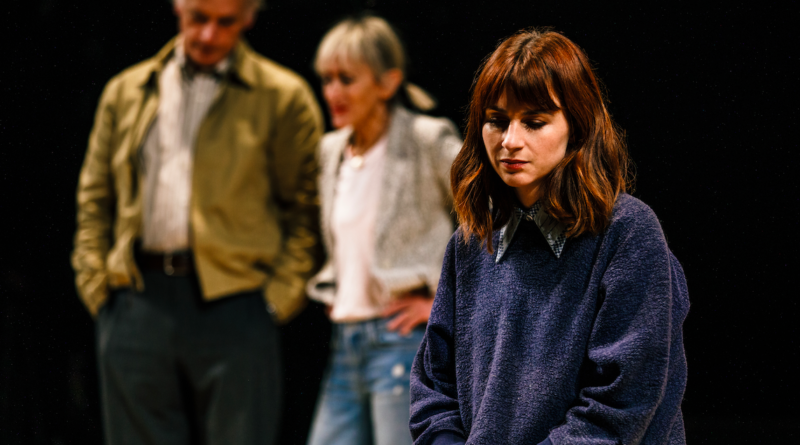INTERVIEW: Daughters, fathers are focus of #MeToo-inspired ‘Best We Could’
Photo: The Best We Could stars, from left, Frank Wood, Constance Shulman and Aya Cash. Photo courtesy of Marc J. Franklin / Provided by BBB with permission.
Now in previews and opening March 1, the new play The Best We Could by Emily Feldman depicts a father-daughter relationship that takes an unexpected turn — quite literally because this is a road-trip play. The show, which is currently running at New York City Center Stage I in a Manhattan Theatre Club production, was inspired, in part, by the #MeToo movement and asks the audience to consider what happens when a daughter reexamines how she views her father. The telling subtitle of the play is (a family tragedy).
“I started writing this play in 2017, and I finished a first draft of it sometime in the spring of 2018 with the help of a development organization called SPACE on Ryder Farm,” Feldman said in a recent phone interview. “It was kind of an amazing moment. SPACE on Ryder Farm is a working farm in upstate New York, and they have a program for artists that runs mostly through the warmer months. And I was apart of something called The Working Farm at SPACE on Ryder Farm, which meant that I went up there that summer for five or six weeks, and then in the spring, they offered all the playwrights that were part of that program developmental readings with four hours of rehearsal or something like that.”
Those readings took place in New York City at Playwrights Horizons, and Feldman thought the occasion would bring out some trusted friends for support. What she didn’t expect was that a junior literary manager from MTC would be in the crowd, and then 48 hours after the reading, she had a production offer from the reputable Broadway and off-Broadway nonprofit.
The reason for the delay in finally mounting this production was because of the COVID-19 pandemic. Feldman, director Daniel Aukin and the cast were set to enter rehearsals in 2020 when the theatrical world (and the entire world) shut down.
“I put the script into a drawer at that time, and I didn’t look at it again until a few months ago when we started to prepare for this new production,” she said. “I usually think of plays as time capsules. They kind of hit save on who the writer was at that moment when they were writing it, and in the last four years, a lot of things have changed in both the world at large and in myself. And so starting to work on it again felt a little bit like meeting a former version of me, but I was really excited that the themes and the ideas in this play still felt really urgent to me. The basics have stayed the same, but I think it has gotten deeper over time.”
In 2017, when The Best We Could was originally penned, there were important conversations being had about patriarchy and misogyny, and Feldman was interested in exploring the generational differences in the #MeToo movement, in particular how her generation responded to the social movement and how her parents’ generation responded.
“I think every woman was thinking through the many facets of the conversation that was going on, and I really started to wonder about the relationship between daughters and their fathers in all of that and how damaging it can be when a person, particularly a man, can’t attune to change in his society,” said Feldman, who was the 2019-2020 Tow Playwright-in-Residence at MTC.
Over the past several weeks, during the rehearsal process, Feldman has been having an engaging collaboration with everybody in the room. She described her interactions with the cast, which consists of Aya Cash, Brian D. Coats, Maureen Sebastian, Constance Shulman and Frank Wood, as interesting, deep and fruitful. The same goes for the creative team, including Aukin.
“We met because I had written this play, and we started talking about it around 2018,” Feldman said of her working relationship with Aukin. “And we workshopped it a bunch of different places. We workshopped it in San Francisco. We were up in New York Stage and Film in Poughkeepsie, also a bit at MTC. In putting together this cast and working with this creative team, we really built our shared tastes over time, and I feel like we have lot of mutual respect and trust between us. It relaxes the creative process a lot. … Neither of us know exactly what the outcome of our collaboration will be, but we have a lot of trust that we’re pointing in the same direction and that we know how to support each other’s process. And, to be honest, it’s just been a lot of fun. There are definitely sad moments in the play, but we laugh a lot in the rehearsal room. I’ve been really astonished by the actors who have elected to work on this play. Obviously, I’m incredibly biased, but I just think they’re five of New York’s finest actors. And we’re working with a really remarkably talented creative team. It just feels like we’re all making something special together. It doesn’t feel like it’s just mine anymore, which is really great.”
By John Soltes / Publisher / John@HollywoodSoapbox.com
The Best We Could by Emily Feldman opens March 1 at New York City Center Stage I, in a production by Manhattan Theatre Club and directed by Daniel Aukin. Click here for more information and tickets.

